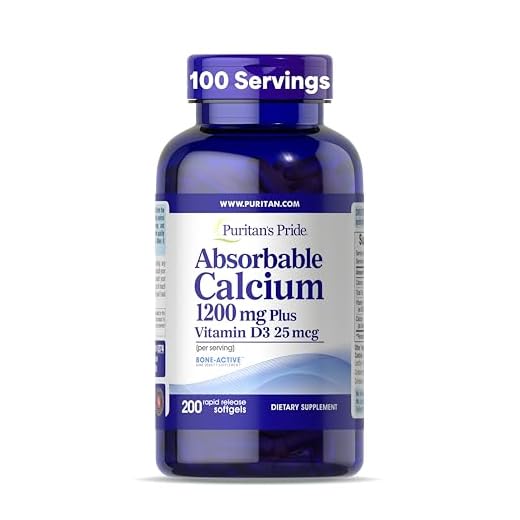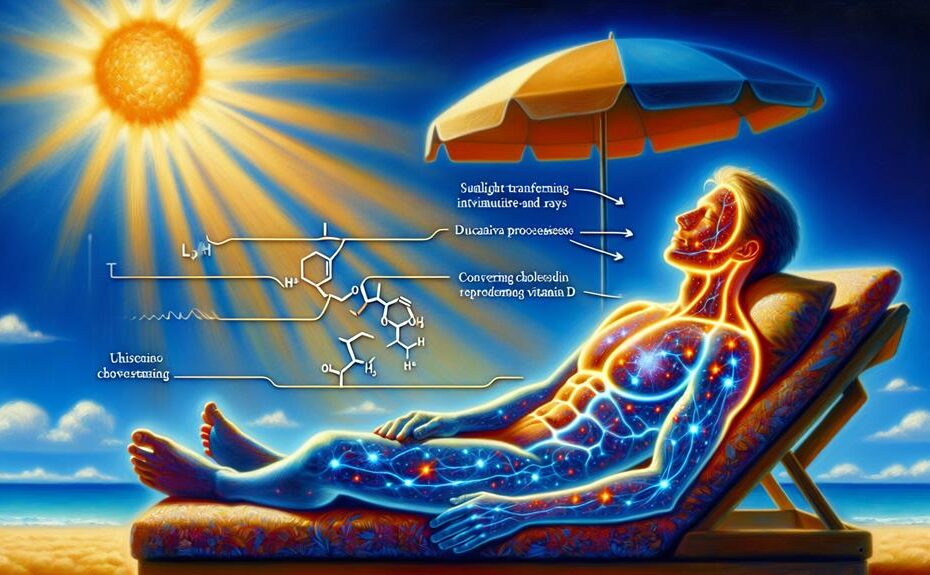







When sunlight hits your skin, UVB radiation initiates an essential process – producing vitamin D. UVB rays convert 7-dehydrocholesterol to previtamin D3. This step is pivotal for calcium absorption and bone health. Lack of sun exposure can lead to vitamin D deficiency. Darker skin needs more sunlight for abundant vitamin D. Balancing sun exposure and diet is critical for ideal levels. Sunscreen with high SPF reduces vitamin D production. Midday sun is best for synthesis. Adequate vitamin D supports bones and immunity. Keep in mind, understanding UVB rays and skin pigmentation is fundamental for vitamin D production.
Key Takeaways
- UVB radiation triggers vitamin D synthesis in the skin.
- Sunlight exposure is essential for converting 7-dehydrocholesterol to previtamin D3.
- Melanin absorption affects the efficiency of UVB rays in vitamin D production.
- Duration and intensity of sunlight exposure impact vitamin D absorption levels.
- Balancing sun exposure and diet is crucial for maintaining optimal vitamin D levels.
The Role of Sunlight in Vitamin D Synthesis
When exposed to sunlight, your skin synthesizes vitamin D through a process triggered by UVB radiation. Sunlight exposure is important for this synthesis to occur efficiently. UVB rays penetrate the skin and reach the cholesterol present in the skin cells. The UVB radiation then initiates a series of chemical reactions that lead to the production of vitamin D. Specifically, UVB radiation converts 7-dehydrocholesterol in the skin to previtamin D3, which is rapidly transformed into vitamin D3.
This process is essential for maintaining adequate levels of vitamin D in your body. Vitamin D plays a critical role in various physiological functions, including calcium absorption, bone health, and immune system regulation. Insufficient sunlight exposure can lead to vitamin D deficiency, which is associated with an increased risk of various health conditions.
Therefore, ensuring regular exposure to sunlight, especially during peak hours when UVB radiation is most intense, is crucial for efficient vitamin D production in your body.
UVB Rays and Vitamin D Production
Exposure to UVB rays is essential for the synthesis of vitamin D in your skin, a process vital for maintaining peak levels of this essential nutrient. UVB rays are responsible for initiating the conversion of 7-dehydrocholesterol in the skin into previtamin D3. These rays penetrate the epidermis and reach the dermis where this conversion takes place. However, not all UVB rays reach this depth due to the absorption by melanin, the pigment responsible for skin color. Melanin acts as a natural sunscreen, absorbing and dissipating UV radiation to protect the underlying layers of the skin. The more melanin present in your skin, the more UVB rays are absorbed, which can impact the amount of previtamin D3 produced. Individuals with darker skin tones may require longer sun exposure to generate adequate vitamin D compared to those with lighter skin tones. Understanding the interplay between UVB penetration and melanin absorption is essential for optimizing vitamin D production through sunlight exposure.
Skin Exposure and Vitamin D Absorption

Optimizing the duration and intensity of sunlight exposure plays an essential role in enhancing the absorption of vitamin D through the skin. When sunlight, specifically ultraviolet B (UVB) rays, penetrates the skin, a cholesterol derivative in the skin is converted into vitamin D. Skin pigmentation affects this process, as darker skin requires more sun exposure to produce the same amount of vitamin D as lighter skin. Individuals with darker skin tones have higher levels of melanin, which act as a vital sunscreen, reducing the penetration of UVB rays and subsequently lowering vitamin D synthesis.
In regions with limited sunlight, dietary sources are vital for maintaining adequate vitamin D levels. Foods like fatty fish, fortified dairy products, and egg yolks are rich in vitamin D. However, relying solely on dietary sources may not provide sufficient vitamin D, making sunlight exposure essential for overall health. Understanding how skin pigmentation influences the absorption of vitamin D and incorporating a balanced diet with regular, appropriate sunlight exposure can help optimize vitamin D levels in the body.
Factors Affecting Sunlight-Induced Synthesis
Factors influencing the synthesis of vitamin D from sunlight involve various biological and environmental considerations that impact the efficiency of this process. When considering sunscreen application, it is important to note that using sunscreen with a high sun protection factor (SPF) greatly reduces the skin's ability to produce vitamin D. Sunscreen acts as a barrier that blocks the ultraviolet B (UVB) radiation necessary for the synthesis of vitamin D.
Moreover, the time of day plays a key role in the efficiency of sunlight-induced synthesis. The skin's ability to produce vitamin D is highest when exposed to sunlight during midday when the sun is at its peak. This is because UVB radiation is most intense during these hours, promoting ideal vitamin D production.
Therefore, to maximize the synthesis of vitamin D from sunlight, it is advisable to spend time outdoors without sunscreen during peak hours, ensuring safe sun exposure to maintain adequate levels of this essential nutrient in your body.
Benefits of Adequate Vitamin D Levels

Sufficient levels of vitamin D in the body are essential for maintaining peak health and supporting various physiological functions. Adequate vitamin D plays an important role in promoting bone health by aiding in the absorption of calcium and phosphorus, essential minerals for bone strength. It helps in preventing conditions like osteoporosis, rickets in children, and fractures in adults. Additionally, vitamin D is also crucial for immune function. It helps modulate the immune response, reducing the risk of infections and autoimmune diseases. Research suggests that a deficiency in vitamin D is associated with an increased susceptibility to infections. By ensuring ideal vitamin D levels, you are providing your body with the necessary support to maintain a strong immune system. Hence, it is important to prioritize sun exposure, dietary sources, or supplements to meet your vitamin D requirements and safeguard your bone health and immune function.




